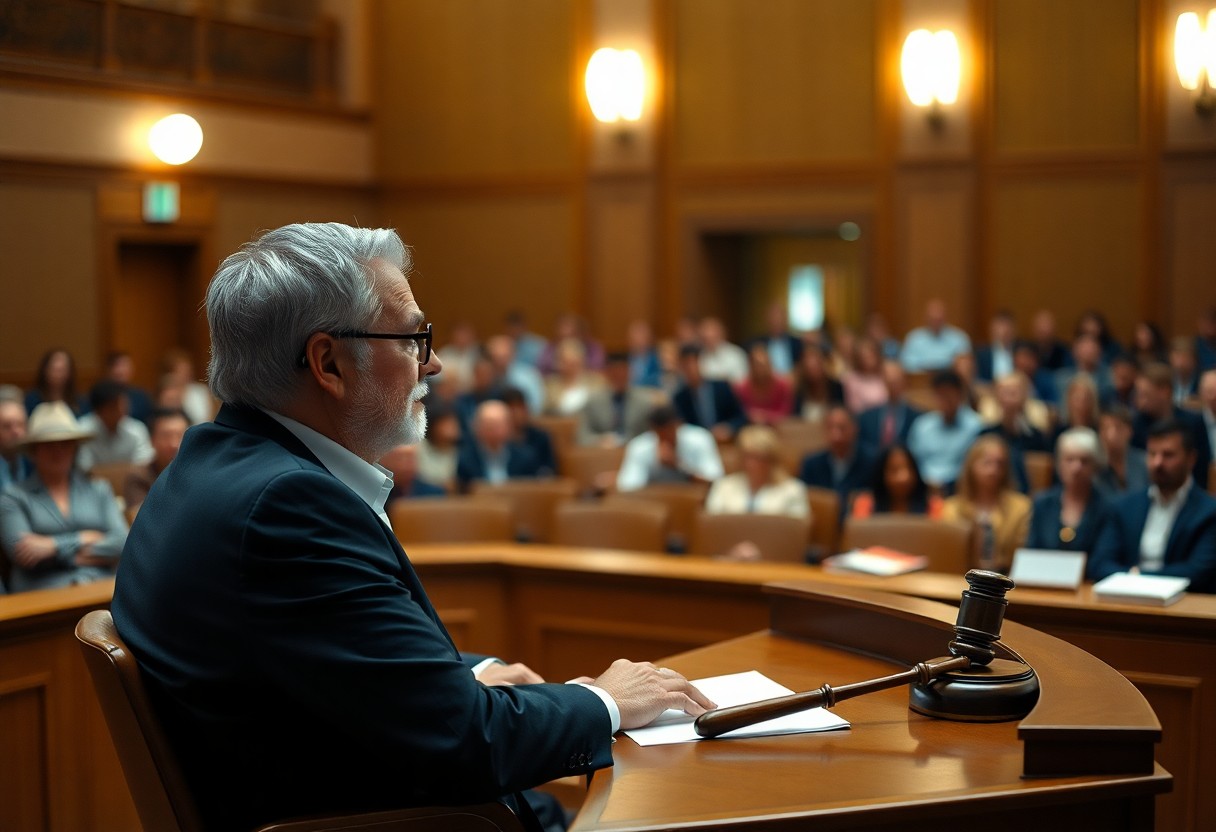It’s important to understand the role of an expert witness in psychology, as they provide specialized knowledge in legal cases involving mental health and behavior. These professionals, often licensed psychologists or psychiatrists, are called upon to offer their expertise to clarify complex psychological issues for judges and juries. You may find their insights invaluable when assessing the impact of mental disorders, competency evaluations, or the effects of trauma. By comprehending their function, you can better grasp how psychological testimony influences legal proceedings and outcomes.
Understanding Expert Witnesses
Before you investigate into the intricacies of expert witnesses in psychology, it’s vital to grasp what they entail.
Definition of Expert Witness
About an expert witness in psychology is a qualified professional who possesses specialized knowledge and experience within the field. They are often called upon to provide their expertise in legal cases involving psychological issues, aiming to assist the court in understanding complex psychological principles and behaviors.
Role of Expert Witnesses in Legal Proceedings
To understand the role of expert witnesses in legal proceedings, consider how they contribute to the judicial process. They provide objective opinions based on their expertise, which can significantly influence the outcome of a case. Their insights often help judges and juries unravel intricate psychological aspects related to criminal behavior, mental health evaluations, and more.
It is important to note that expert witnesses do not advocate for either party. Instead, their role is to educate the court, offering impartial opinions based on their specialized knowledge. This can involve evaluating evidence, assessing the mental state of individuals involved in the case, and providing testimonies that clarify complex psychological concepts.
Distinction Between Expert Witnesses and Fact Witnesses
Between expert witnesses and fact witnesses, the primary difference lies in their functions and types of knowledge they offer. Fact witnesses recount their personal observations or experiences related to the case at hand, while expert witnesses provide their specialized insights backed by extensive knowledge and experience in psychology.
In addition, you should recognize that fact witnesses testify about what they have seen or heard directly, which means their value lies in their firsthand accounts. In contrast, expert witnesses interpret facts and evidence through the lens of their expertise, offering a deeper understanding that can help the judiciary make informed decisions. This distinction is vital for contextualizing the contributions of each type of witness in a legal scenario.
Psychology as a Field for Expert Witnessing
There’s a profound intersection between psychology and the legal system, making it a vital area for expert witnessing. The insights provided by psychologists can help courts understand the mental states, behaviors, and competencies of individuals involved in legal proceedings. This relationship not only informs jury decisions but also enhances the overall administration of justice.
Overview of Psychology’s Relevance in the Courtroom
To appreciate the significance of psychology within the courtroom, you must recognize that psychological assessments can illuminate matters like competency, criminal intent, and the mental health of defendants. These insights aid jurors and judges in making informed decisions based on the intricacies of human behavior.
Types of Psychological Expertise
Witnessing the various branches of psychological expertise can illuminate how they cater to specific legal contexts. Understanding these areas helps you appreciate the breadth of knowledge that expert witnesses bring to the courtroom. Here are some common types of psychological expertise:
- Clinical Psychology
- Forensic Psychology
- Neuropsychology
- Child Psychology
- Developmental Psychology
After identifying these specialties, it’s necessary to grasp that each type can provide targeted insights depending on the case’s demands.
| Type of Expertise | Application in Court |
| Clinical Psychology | Assessment of mental health issues |
| Forensic Psychology | Evaluation of criminal behavior |
| Neuropsychology | Understanding brain injuries and impacts |
| Child Psychology | Investigating child welfare in custody cases |
For instance, each area of expertise can shine light on specific aspects of a case, allowing for clearer insights into the psychological dynamics at play. Here are more examples of areas that fall under different psychological specialties:
- Cognitive Behavioral Assessments
- Trauma Impact Evaluations
- Competency Evaluations
- Jury Consultation
- Expert Testimony on Mental Health Issues
After reviewing these categories, it’s clear how diverse the field is and the range of insights an expert can provide.
Legal Contexts Requiring Psychological Expertise
Field knowledge regarding the legal contexts necessitating psychological expertise is necessary to understanding the broader implications of such testimonies. Cases involving mental health, criminal behavior, and custody often require specialized psychological insight to guide judicial processes.
Understanding the various legal contexts tells you when expert psychological testimony might be indispensable. From criminal trials to civil litigations, the involvement of expert witnesses can provide clarity around complex emotional and cognitive issues. These testimonies often address :
- Evaluating a defendant’s mental state
- Assessing the reliability of eyewitness testimony
- Understanding the psychological impact of traumatic experiences
- Determining fitness to stand trial
- Providing insights into child and adolescent behaviors
After considering these contexts, it becomes evident how psychological expertise contributes significantly to legal determinations and the pursuit of justice.
Qualifications of an Expert Witness in Psychology
For individuals to serve as expert witnesses in psychology, they must meet specific qualifications that demonstrate their expertise and credibility in the field. These qualifications typically encompass educational background, licensure, certification, and relevant experience in forensic psychology. Understanding these requirements is imperative for anyone considering a career as an expert witness in this discipline.
Educational Requirements
Below are the educational requirements you need to fulfill to become an expert witness in psychology. Typically, you should have at least a master’s degree or, more commonly, a doctoral degree in psychology or a closely related field. Advanced education not only deepens your knowledge but also strengthens your position as an authority in psychological matters.
Licensure and Certification
An expert witness must also hold appropriate licensure and certification in their field. Most jurisdictions require psychologists to be licensed as clinical psychologists, which necessitates passing a national exam, as well as fulfilling state-specific criteria. Obtaining certification from a recognized board can further validate your qualifications and expertise.
Consequently, securing licensure and certification is imperative for establishing your credibility as an expert witness. They signal to the court and other involved parties that you meet the professional standards necessary to provide accurate assessments and insights into psychological matters. This validation can significantly strengthen your standing in legal proceedings.
Experience and Training in Forensic Psychology
Along with formal education and licensure, you must possess substantial experience and training in forensic psychology to qualify as an expert witness. This experience can include working in various forensic settings, such as criminal courts or civil cases, where psychological evaluations are necessary.
Qualifications in this area are multi-faceted and stem from both direct experiences in forensic settings and specialized training. Your ability to interpret psychological assessments, understand legal terminology, and provide expert testimony hinges on your practical experiences in the field. Having a robust background further enhances your competency and reliability when conveying complex psychological principles in court.
The Process of Becoming an Expert Witness
To begin on the journey of becoming an expert witness in psychology, you must undertake a process that requires dedication, education, and practical experience. This path not only enhances your professional standing but also equips you with the necessary tools to effectively contribute to legal cases.
Steps to Establish Expertise
With a solid foundation of education and specialized training in psychology, you can begin to build your expertise. This typically involves obtaining advanced degrees, accumulating pertinent clinical experience, engaging in relevant research, and gaining recognition in your area of specialization. Networking with legal professionals can further enhance your credibility.
Preparing for Court Testimony
Against the backdrop of your growing expertise, preparing for court testimony requires you to familiarize yourself with legal terminology, procedures, and the specific case at hand. Understanding the context of your testimony is vital for effective communication.
Expertise in your field must translate to the courtroom setting. Preparation involves not only reviewing case materials and formulating clear, concise responses but also practicing how to convey complex psychological concepts to a lay audience. Engaging in mock trials or collaborating with legal professionals can bolster your confidence and ensure you are well-prepared for your role as an expert witness.
Importance of Continuous Education
Education is vital for maintaining your standing as an expert witness. The field of psychology is dynamic, and you should pursue ongoing training, attend workshops, and stay updated on the latest research and legal developments to sharpen your skills and knowledge.
But this commitment to continuous learning is what sets you apart in this profession. As psychological theories evolve and new practices emerge, your ongoing education will allow you to provide informed, up-to-date insights during legal proceedings. This responsiveness not only enhances your expertise but also builds trust with the courts and legal teams you work with.
Responsibilities of an Expert Witness
Now, as an expert witness in psychology, you have specific responsibilities that are imperative for maintaining the integrity of the judicial process. Your role requires not only expertise in your field but also the ability to communicate complex psychological concepts effectively. The responsibilities you hold can extensively influence legal proceedings, meaning that your actions and opinions can impact lives.
Providing Objective Opinions
Above all, you must provide objective opinions based on reliable evidence and your professional judgment. This process involves analyzing the relevant facts while remaining unbiased and impartial, ensuring that your insights aid in the pursuit of justice rather than serve any personal or external interests.
Preparing Evaluation Reports
Between your evaluations and court appearances, preparing thorough and accurate evaluation reports is one of your primary responsibilities. These documents detail your findings, methodologies, and conclusions drawn from assessments, making them vital for legal decision-making.
In addition to presenting your findings, these evaluation reports must be meticulously crafted to adhere to legal standards and can often be scrutinized by other professionals. This means that you should include background information, testing results, and clear rationale behind your opinions, all while ensuring that the documents are understandable to those without a psychological background.
Engaging in Cross-Examination
At the heart of your responsibilities lies the need to engage in cross-examination effectively. This process assesses the validity of your testimony and the soundness of your opinions, allowing opposing counsel to challenge your conclusions.
Also, when faced with cross-examination, you must remain composed and articulate. It is imperative to uphold your credibility by clearly explaining your methodologies and reasoning behind your conclusions. This not only demonstrates your expertise but also reassures the court of the reliability of your assessments. The ability to withstand scrutiny while adhering to your professional principles is critical in reinforcing the integrity of your testimony.

Challenges Faced by Expert Witnesses
All expert witnesses in psychology encounter numerous challenges that can affect their performance in court. Understanding these challenges helps you to better navigate the complex landscape of legal proceedings.
Legal and Ethical Dilemmas
Between the demands of the legal system and the principles of ethics, you may find yourself in a difficult position. Balancing the need to provide impartial testimony while adhering to confidentiality and professional standards can lead to uncomfortable choices.
Handling Bias and Subjectivity
With personal experiences and beliefs influencing perceptions, managing bias is a major concern for you as an expert witness. Being aware of your own biases and how they might impact your assessments is vital to maintaining the integrity of your testimony.
Faced with various pressures, you need to actively engage in self-reflection and seek feedback from peers to minimize the potential for bias. Employing standardized assessment tools can also help provide a more objective view, allowing you to offer sound recommendations based on evidence rather than personal beliefs.
The Pressure of Testifying in High-Stakes Cases
Testifying in high-stakes cases can elevate anxiety levels for you as an expert witness. The outcome of these cases may significantly affect lives, families, and communities, placing additional pressure on your role to provide accurate and reliable information.
Even when you are well-prepared, the courtroom environment can be intimidating. The scrutiny from attorneys and the judge, combined with the high expectations from all parties involved, can heighten your stress. With effective preparation, however, and by focusing on the facts, you can maintain perspective and deliver your testimony effectively.
Final Words
On the whole, understanding what an expert witness in psychology entails is vital for anyone involved in legal proceedings. An expert witness brings specialized knowledge and insights to the courtroom, helping you comprehend psychological aspects relevant to a case. Their role is to provide objective evaluations, testimonies, and evidence-based opinions that can significantly influence the outcome of legal matters. By recognizing the importance of expert witnesses, you can better appreciate the intersection of psychology and law, ensuring more informed decisions in legal contexts.
FAQ
Q: What is an expert witness in psychology?
A: An expert witness in psychology is a qualified individual who provides their expertise to assist the court in understanding complex psychological issues. Their role often includes interpreting psychological assessments, presenting findings from research, and offering opinions on matters involving mental health, behavior, and psychological conditions relevant to legal cases.
Q: What qualifications does an expert witness in psychology need?
A: Expert witnesses in psychology are typically required to have advanced degrees, such as a PhD or PsyD, in psychology or a related field. Additionally, they should possess relevant experience, licensure as a clinical psychologist or a related credential, and often have specialized training in areas pertinent to the case they are testifying about, such as forensic psychology or clinical assessment.
Q: In what types of cases would an expert witness in psychology be utilized?
A: Expert witnesses in psychology are frequently utilized in various types of legal cases, including criminal cases (e.g., insanity defenses, competency evaluations), civil litigation (e.g., personal injury claims, custody disputes), and cases involving psychological damage (e.g., cases of workplace harassment or trauma). Their insights can significantly influence the proceedings by providing a psychological context to the facts of the case.
Q: How does an expert witness present their findings in court?
A: An expert witness presents their findings in court through written reports, oral testimony, and visual aids as necessary. They explain their methodologies, findings, and conclusions in a manner understandable to judges and juries, often using clear language and avoiding technical jargon. Their goal is to provide an objective analysis that helps clarify the psychological aspects relevant to the case.
Q: What factors influence the credibility of an expert witness in psychology?
A: The credibility of an expert witness in psychology is influenced by several factors, including their educational background, clinical experience, professional affiliations, history of published research, and their ability to communicate effectively. Additionally, their impartiality and adherence to ethical standards are necessary for establishing trustworthiness in the eyes of the court.





